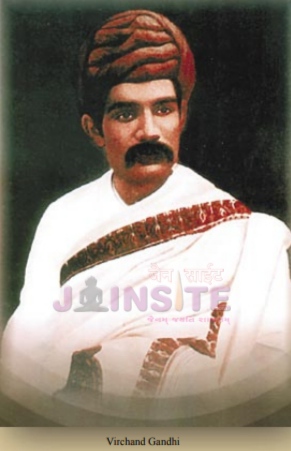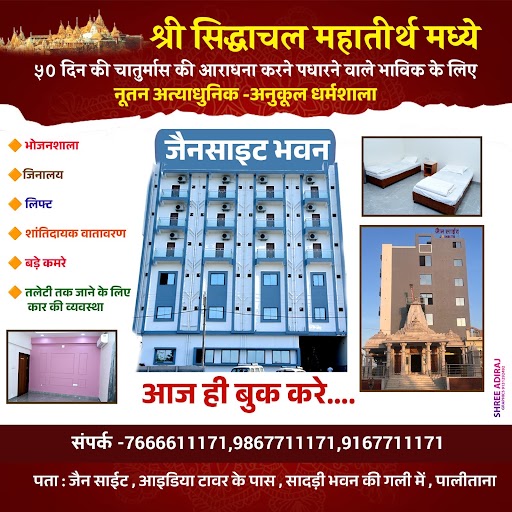Virchand R. Gandhi
A Brief Summary of his Life and Mission
(August 25, 1864 to August 7, 1901)
It was the memorable day of September 11, 1893. The Columbus Hall of the Art Institute of Chicago was overflowing with more than 3,000 delegates of different nations and religions. It was the opening day of the Parliament of World Religions Conference, the first such conference ever organized in the history of
mankind. The aim of the conference was to impart to the world, the knowledge of different religions, to promote a feeling of fraternity between followers of diverse religious persuasions, and to pave the
way for world peace. The conference lasted for 17 days.
Two young men among them, with their Indian costumes and turbans drew special attention from the public – one was the world famous Swämi Vivekänanda, who represented Hinduism and the other was Shri Virchand Räghavji Gandhi who represented Jainism. They made such an impact at the Parliament of Religions with their impressive speeches and personality that both of them were requested to prolong their stay in the USA and continued to give speeches at different cities after the conference was over.
Shri Virchand Gandhi, a young man of twenty-nine, impressed the delegates not only by his eloquence, but also by the sheer weight of his scholarship. The impartiality of his outlook and the oratorical skill of this man fascinated the delegates at the conference. An American newspaper wrote, “Of all eastern scholars, it was this youth whose lecture on Jain faith and conduct was listened to with great interest attention.”
Shri Virchand R. Gandhi was born on August 25, 1864 in Mahuva, near Bhavanagar, Gujarat, India. After his primary and secondary education in Bhavanagar, he joined Elphinstone College in Mumbai. He graduated and obtained a B.A. Degree with honors from the University of Bombay in 1884. He was probably the first graduate amongst the Jains at that time. He was also a student of Buddhism, Vedanta Philosophy, Yoga, Christianity and Western philosophy. He had also done a comparative study of various philosophies, which equipped him for talks on various subjects with confidence. He had command over fourteen languages including Gujarati, Hindi, Bengali, English, Präkrit, Sanskrit, and French.
Shri Gandhi became the first honorary secretary of the Jain Association of India in 1885 at the age of 21. As secretary, he worked very hard for the abolition of poll tax levied on pilgrims to Mount Shatrunjay, the most sacred place of Jain religion at Palitänä, Gujarat, India. In those days to protest against the ruler was to invite severe punishment and even death. He prepared a case to compromise. He made a strong representation to Lord Ray, the governor of Bombay, and Colonel Watson, the political agent and eventually abolished the poll tax in place of a fixed payment of Rs. 15,000 per year to the ruler for looking after the safety of the pilgrims and the holy place.
In 1891 Mr. Boddam, an Englishman set up a factory for slaughtering pigs and making tallow out of them at Mount Sametshikhar, another holy place of Jain pilgrimage near Calcutta, in the state of Bihar, India. Shri Virchand Gandhi went all the way to Calcutta to stop the killing of pigs at the holy place. He stayed there for six months, learned Bengali, prepared his case against the factory, and ultimately got this verdict issued: “Sametshikhar is a place of Jain pilgrimage and nobody else has any right to interfere there.” He got the factory to close down.

Virchand Gandhi
Shri Virchand Gandhi was a great social reformer at a very young age. At the very young age of 22, he wrote long essays to remove evil social customs and continuously fought against it and was successful in
eradicating some of them.
Shri Virchand Gandhi sailed to USA along with Swämi Vivekänanda to attend the Parliament of World Religion Conference in 1893. He stayed in USA for about two years after the conference and gave lectures in cities such as Chicago, Boston, New York, and Washington. He also visited England, France, Germany and other places in Europe. In foreign countries he wore a long and loose kurta, a white shawl on his shoulder, a golden bordered Kathiawadi turban on his head, and country shoes. This external appearance bore the imprint of India. He delivered more than 535 lectures on Jainism, Yoga, Indian systems of philosophy, Indian culture, occultism, and spiritualism. He qualified as a Barrister in London at one of the Inns of the Court but did not use this qualification for monetary gain.
Virchand Gandhi talked about the doctrines of Jainism in such a coherent manner that some newspapers published the text of his lecture in full. He had a most effective way of handling the otherwise difficult
terminology of Jainism. He had an extraordinary ability to clarify his statements in a consistent and logical manner. At the conference, he made a brief but striking presentation on the fundamentals of Jain religion. He expounded Jain religion in its main aspects namely: Jain philosophy, Jain way of life, and Jain code of conduct.
Another special characteristic of Shri Virchand Gandhi’s lectures on Jain religion was that they did not deal in criticism of other religions. Free from sectarian preferences and prejudices, his impartial ideology is an apt expression of the Jain who practices non-violence (Ahimsa) in life and pluralistic views
(Anekäntaväda) in thoughts. His discourses convinced the elite of America of the fact that Jain religion has an authentic and rational religious tradition. His speeches received extensive publication in several leading newspapers.
Shri Virchand Gandhi was a great exponent of Indian culture and religion, besides being a brilliant scholar of Jainism. His speeches at the parliament echoed the true spirit and culture of India. The prevailed belief in America was that India was a country of tigers, serpents, magicians, and kings. Christian missionaries also presented a distorted picture of the people of India. Shri Virchand Gandhi and Swämi Vivekänanda
made a great effort to give the people abroad the true perspective on India. Explaining the importance of Indian culture to foreigners, he said, “It is an astonishing fact that foreigners have been constantly attacking India and in the face of all those aggressions the soul of India has stood vital and
watchful. Her conduct and religion are safe and the whole world looks at India with a steady gaze.”
Shri Virchand Gandhi was not a dogmatic person. He spoke as a Jain but he forcefully defended Hinduism from the attack of Westerners at the Parliament. Above all, he was first Indian then Jain. He was accorded a warm reception and shown the highest appreciation from clubs, literary and church societies, philosophical branches, and spiritual associations in USA and other countries. His lectures also served to educate the Western society regarding the salient features of Indian culture.
Five decades before the independence of India, Virchand Gandhi had a prophetic vision. He said in one of his lectures, “You know my brothers and sisters, that we are not an independent nation, we are subjects of Her Gracious Majesty Queen Victoria the ‘defender of the faith’, but if we are a nation in all that the name implies with our own government and our own rulers, with our laws and institutions controlled by us free and independent, I affirm that we should seek to establish and for ever maintain peaceful relations with all the nations of the world.”
Virchand Gandhi was not only a philosophical thinker but he also had the welfare of the nation at heart. He collected a shipload of grain and about Rs. 40,000 ($10,000) cash for famine relief in India in 1896 while he was in USA.
In America, Virchand Gandhi founded various societies, such as:
• The Gandhi Philosophical Society
• The School of Oriental Philosophy
• The Society for the Education of Women of India
The secretary of the latter institution was Mrs. Howard who had adopted pure vegetarianism, practiced Sämäyika daily, and followed other codes of conduct of Jainism. In England, he founded the Jain Literature Society and taught Jainism there. Mr. Herbert Warren, a religious enthusiast, abandoned non- vegetarianism and adopted the Jain religion. He summarized Virchand Gandhi’s lectures and published a book known as ‘Herbert Warren’s Jainism.’
The following literature was published by Shri Virchand R. Gandhi or complied from his speeches:
Title YearPublished Language. Pages
Jaina 1907. English. 375
Philosophy
Karma 1913 English. 221
Philosophy
Yoga. 1912/1993 English. 309
Philosophy
The Systems 1970/1993 English. 188
of Indian
Philosophy
Selected speeches 1963.. English 85
speeches of
V. R.Gandhi
Religion and 1993. English 264
Philosophy of
Jains
Essay – Radvä . . 1886 Gujarati. 37
Kutväni
Hanikärak Chäl
Concentration – 1916 English 64
12 Lectures on
Meditation
The Unknown Life. 1894 English. 128
of Jesus Christ
Savirya Dhyäna 1902/1989 Gujarati 158
Herbert Warren’s 1961/1983 English 164
Jainism


